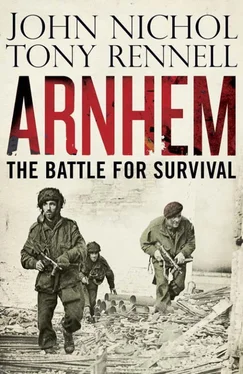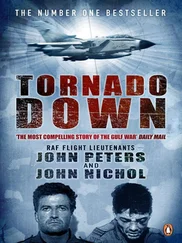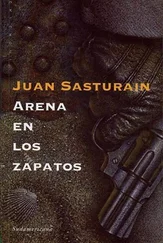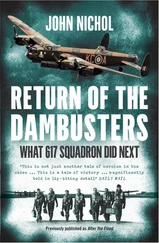The belligerent Monty had finally got his way – well, partly, at least. At a meeting in Brussels, Eisenhower, weary himself not so much of the war but of his warring generals and their constant bickering and backbiting, agreed that Monty’s Second Army should mount a thrust of its own. This ‘left hook’ would sweep northwards through the Netherlands to try to outflank the German defences. Then it would descend on the industrial powerhouse of the Ruhr valley. His battle-plan – described by him with characteristic immodesty as ‘certainly a bold one’ – was for the Allied forces to drive hard and fast towards the Rhine and grab a bridgehead on the other side ‘before the enemy reorganized sufficiently to stop us’. That would mean first getting over numerous rivers and canals in the Netherlands, notably the River Maas at the town of Grave and the River Waal at Nijmegen. Each would be taken by storm from the air.
To the American airborne divisions he gave the task of securing Eindhoven (20 miles behind enemy lines) and the bridges at Grave and Nijmegen (40 miles behind the lines), while to the British airborne division fell the hardest part – capturing the Arnhem bridge, 64 miles into enemy territory. Meanwhile, XXX Corps, the spearhead of the Second Army, commanded by Lieutenant-General Brian Horrocks with the Guards Armoured Division in pole position, would set out from the Meuse-Escaut canal and race by land over the captured ‘carpet’ laid down by the Allied airborne troops to reinforce them and consolidate what they had captured. Within forty-eight hours, he was confident that XXX Corps would have linked up with the 1st British Airborne Division at Arnhem and secured a substantial bridgehead on the German side of the Lower Rhine. With that in place, more reinforcements would head eastwards and the Second Army would ‘establish itself in the general area between Arnhem and the Zuider Zee, facing east, so as to be able to develop operations against the northern flank of the Ruhr’. [11] In his memoirs, Montgomery gave a succinct summary of Market Garden. ‘My plan was to drive hard for the Rhine across all river and canal obstacles and to seize a bridgehead beyond the Rhine before the enemy reorganized sufficiently to stop us. The essential feature was the laying of a “carpet” of airborne forces across the five major water obstacles which existed on the general axis of the main road through Eindhoven to Uden, Grave, Nijmegen, and thence to Arnhem. XXX Corps was then to operate along the axis of the “carpet”, link up with the 1st British Airborne Division in the Arnhem area and establish a bridgehead over the Neder Rijn north of that place. Second Army was then to establish itself in the general area between Arnhem and the Zuider Zee, facing east, so as to be able to develop operations against the northern flank of the Ruhr.’
Next stop: Berlin. It was a plan intended to make the Führer tremble, demoralize his armies and undermine the will of the German people to continue a war they were now certain to lose.
Pride of place in the operation was reserved for the British forces. Their objective – Arnhem – was at the furthest end of the line, their attack the deepest inside enemy territory. But it was a fight that the British 1st Airborne were up for. They had been seriously disappointed and even affronted at missing out on the Normandy landings. The 6th were dropped into France while the 1st were held in reserve and never used. There had been numerous schemes to deploy them in the advance through France and Belgium but, when German resistance collapsed in late August, the front line moved forward so fast that they never had the chance to drop behind it. At the headquarters of the Airborne Corps in the plush surroundings of the exclusive Moor Park Golf Club in Hertfordshire, detailed operations were drawn up by Major-General Roy Urquhart, commander of the 1st Airborne Division, and his staff, intensively trained for, then abandoned without a ripcord pulled or a shot fired. Gliders were loaded for action, then unloaded. ‘Order, counter-order and consequent disorder are the order of the day,’ Major Ian Toler, commanding officer of a glider squadron, noted ruefully in his diary, stuck with the unenviable task of keeping his men focused while stifling his own growing despair. ‘We just sit back and laugh, as always.’ But the joke was wearing thin. [12] Major Toler. Diary. Provided by Major Mike Peters, Army Air Corps.
Sixteen times in three months the airborne forces had been on the brink of going into action, on Op Transfigure, Op Wild Oats, Op Comet, or some such fancy name. They should have liberated Paris. Sometimes they got as far as boarding the plane before the order to stand down came, more often than not because their target had already been overrun by the advancing land forces. ‘The suspense was killing us,’ said Sergeant Ron Kent, a pathfinder para, whose job would be to go in just ahead of the main force and secure the drop zone. ‘The only fighting we were getting was with the Yanks in the pubs of Salisbury, Newark and Huddersfield!’ [13] Private memoir. Airborne Assault, Imperial War Museum, Duxford.
Constant square-bashing, route marches and weapons training were meant to keep the men alert and ready but, as Kent explained, ‘We were like boxers, in danger of becoming over-trained, afraid of passing our peak.’ Each time they were stood down, they got a 48-hour pass to go to London to make up for having been confined to barracks in the run-up to the aborted mission. But each time, too, more puff went out of their sails and the sharp edges the fighting man depended on were blunted.
Even the commander was losing patience and perhaps even some of his edge. ‘By the time we went on Market Garden we couldn’t have cared less,’ Urquhart conceded in an interview after the war. [14] Quoted in Monty: The Field-Marshal , by Nigel Hamilton. Sceptre, 1986.
‘We became callous. Every operation was planned to the best of our ability in every way. But we got so bored, and the troops were more bored than we were. We had approached the state of mind when we weren’t thinking as hard about the risks as possibly we had done earlier.’ Ironically, given all the delays and the hanging about, when Market Garden was conceived, it all came in a rush. It was 10 September before Urquhart was made privy to Monty’s master plan and two days later before he was in a position to brief his brigadiers and their staff officers for what was, in effect, a hurriedly revised version of Comet, the last cancelled operation. He didn’t like some of the conditions imposed on him, in particular the choice of drop and landing zones. They were too far from the centre of Arnhem in his opinion, a view many others shared. But this was the RAF’s call, and the judgement of its planners was that, if the planes flew in any closer, the German flak and the unsuitability of the soft, riverside ground for gliders to land would be major difficulties. Urquhart didn’t have time to win the argument, even if such a thing were possible. There were just five days to the off. And, anyway, after so many false starts, he was raring to go. He remembered ‘the euphoria which existed across the Channel and in the Airborne Corps that the war was nearly over and any new operations would be the final nudge to complete German defeat’.
If the men themselves greeted the latest operation with scepticism, it was hardly surprising. The briefing Ron Kent was called to on Saturday 16 September seemed, at first, little more than a repeat of the one a fortnight earlier for Comet. ‘We were going to Arnhem. The dropping zone was about five and a half miles west of the town, well inside Holland and almost into Germany. If we could take and hold the bridge long enough we might be in Berlin by Christmas.’ That’s if they ever got off the ground. ‘What’s the betting we’ll be in London on a pass tomorrow?’ one cynic called out.
Читать дальше












